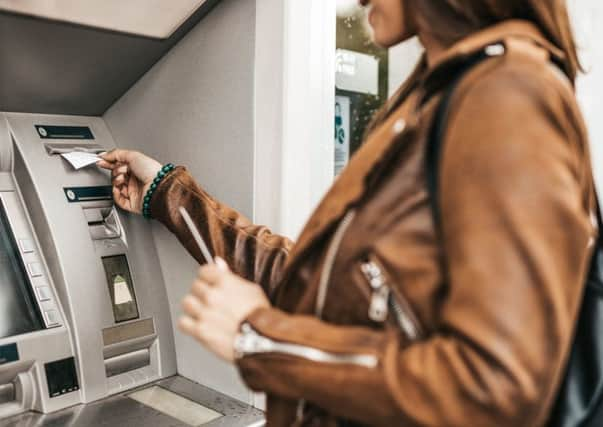Anxiety grows about how to fill the gap left by the hole in the wall


Consumer campaigners have been highlighting fears about people’s continued ability to obtain notes and coins – while industry bodies have been explaining how they’re tackling the issue.
Here’s a look at what the access to cash debate is all about.
How has cash use changed?
Advertisement
Hide AdAdvertisement
Hide AdMany people now use cash less often – alongside the rise of mobile banking and contactless payments.
In 2008, 60 per cent of payments were made in cash, but by 2018, this had shrunk to 28 per cent. By 2028, it’s predicted just 9 per cent of payments will be in cash, according to trade association UK Finance.
Last year, 5.4 million consumers rarely used cash – making one or no cash payments per month. But many rely heavily on cash. Some 1.9 million consumers mainly used cash for their spending last year.
What concerns have been raised?
Bank branch and cashpoint closures have sparked fears people are being pushed towards a “cashless” society.
Consumer group Which? found some people face a long bus journey or even need to hop on a ferry to find their nearest free-to-use ATM.
Recent reductions to the fees that card issuers pay to ATM operators have fuelled concerns more machines could close. Meanwhile, around a third of the UK’s bank branches have shut within the past five years alone, often in areas where poor access to wifi and broadband further limit payment options.
What’s the Post Office’s role?
To help support cash access, banks have arranged for everyday banking services to be available through the Post Office, which has more than 11,500 branches.
Last year, it handled some 130 million transactions on behalf of UK banks. A new three-year agreement has just been reached, so customers can continue to have this service.
Advertisement
Hide AdAdvertisement
Hide AdBut controversially, Barclays has decided to end over-the-counter cash withdrawals from Post Office branches for its customers next year, although its other existing services will still be available. Barclays has also pledged not to close branches in remote areas or where it is the last bank in town, for the next two years.
What’s the industry doing?
A new £1 million fund has been launched – meaning consumers can request a free ATM directly from cash machine network Link, when it’s needed. The Community Access to Cash Delivery Fund enables local communities to apply through their MP, local council, or request help directly.
John Howells, Link chief executive says: “We’re already beginning to commission new ATMs across the UK. We want to hear from more communities who have poor access to cash. If it meets our criteria, Link will install a free-to-use ATM.”
Trade association UK Finance has another scheme – the Community Access to Cash Initiative – to help fill cash gaps. It will help to set up solutions, such as cashback initiatives, where a new ATM isn’t appropriate or required.
So who’s keeping an eye on payments?
The Payments Systems Regulator (PSR) says: “Everyone should have a good choice of how to make payments in ways that work well for them, and cash still has an important role to play.
“The PSR is focusing on key areas where we can help make a difference. Last year, we used our powers and gave specific direction to ensure Link met its commitment to protect the geographic spread of free-to-use ATMs.”
What can I do if I’m concerned about a lack of cash in my area?
Resolver.co.uk is encouraging people who are worried about losing their free cashpoint to complain at resolver.co.uk/save-your-atm.
And if your bank has just closed your local branch, you could vote with your feet – and switch to one whose doors are open.